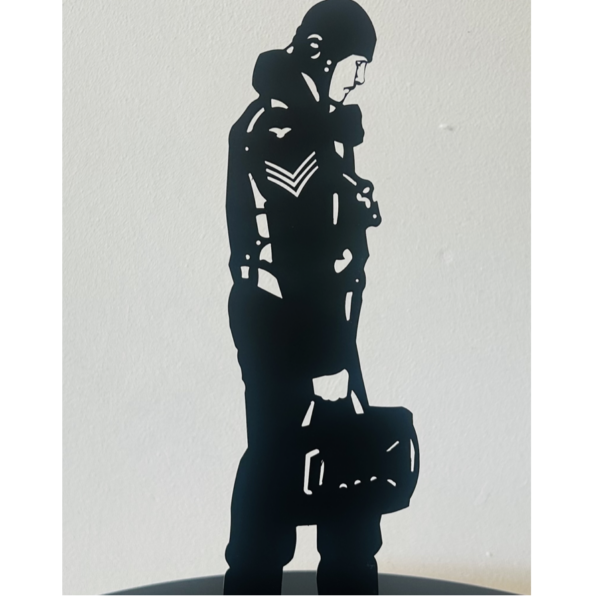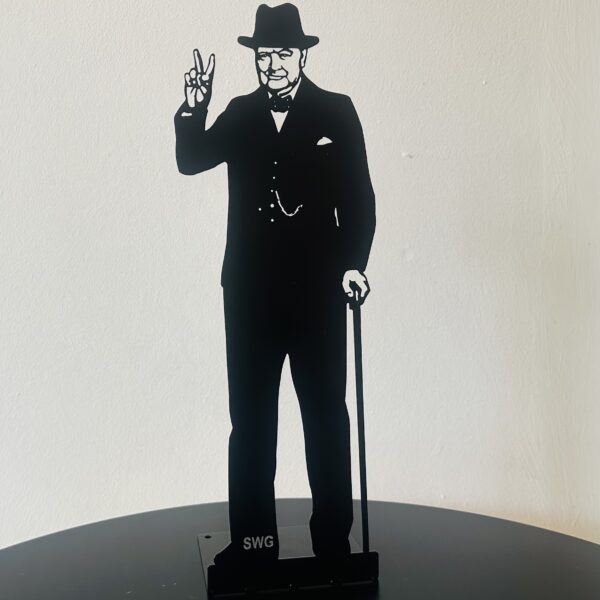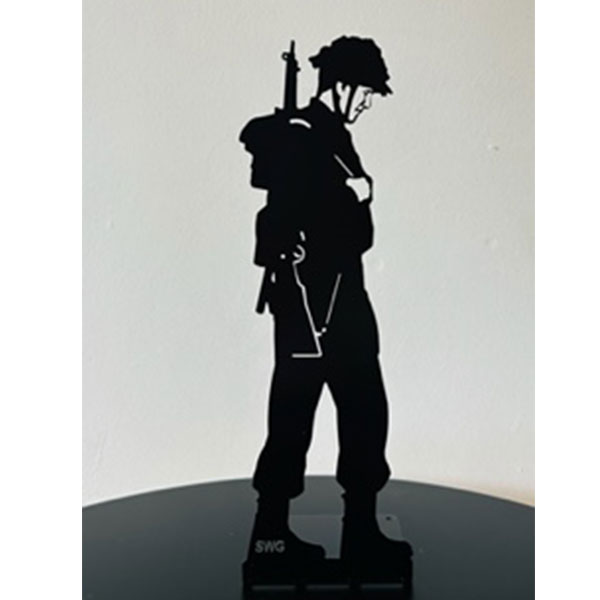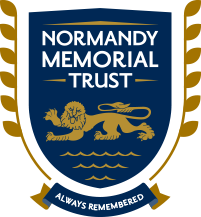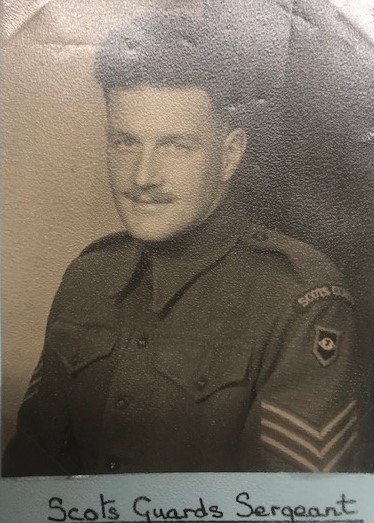
Edward McKinnon Watson
This story and photo is shared by the Trust with kind permission from Linda Waite, daughter of Edward Watson
My father, Edward McKinnon Watson, a Sergeant in X Company, Scot’s Guards was a survivor from Hospital Ship Amsterdam which sank after hitting a mine off Juno Beach on 7th August 1944.
He survived the war albeit with a piece of shrapnel close to his heart, for life – he died of old age in 2012 aged 95. Many years ago when he knew that my husband and I were travelling in France; he gave us a very tatty map of where he was wounded.
After many weeks of searching we stumbled on a village called Maisoncelles (St Charles de Percy) in Normandy and were directed to the then Mayor Michel Leteinturier who had written a history of the fight to liberate his village. It was on his farm that my father was wounded. We kept in contact and took my Father to the 50th anniversary to see where he was wounded and to meet Michel. We have since attended several of the commemorations there (we live in France) and keep in touch with Michel and his wife. There is a small cemetery outside the village where two of my Father’s men are buried.
For many years I had asked my father about his story and when I took early retirement, I finally had time to sit with him and he wrote it all down. Here is part of his story:
“My Corporal and I went along a lane to a farmhouse later that day. The farmhouse was packed with people and they gave us a terrific welcome; my Corporal could speak French and apparently most of the villagers had been in there. On our way to the farm, we shot two Germans who were hiding in one of the out buildings (When we went over to the 50th anniversary, I was very disappointed that I didn’t get to it, but it had all changed and as I only saw the village in the dark, I could not recognise it). Whilst there in the sllit trenches, a Pathe News team came along and took pictures. (more later) We left there to go to Maisoncelles. On the way one of my friends was killed. Sergeant Tessier. We dug in in slit trenches alongside a lane and in it was a deserted Tiger tank; it had a lot of loot in it – wine, tobacco, silk stockings etc which we helped ourselves to. I also took a Luger pistol from it. As it got dark, we could hear and see Tiger tanks coming towards us, they stopped opposite us and we could hear them talking. A guardsman called McPhee from our platoon got out of his trench and went across the lane into a field near the tanks, he was, of course, shot and he started to scream. I got out of my trench to see where he was and without warning I was hit in the chest and came round to find myself on a stretcher on top of a jeep. It took me to our H.Q. which was in the nearby farmhouse. I remember speaking to Lt Llewelyn there and the next thing I had been taken to an underground First Aid Post.
The next day I came to and found my pistol and all my loot had gone, but I had a lot of banknotes which I had picked up going through a village where a bank had been hit and I still had those. Whilst I as in there I was given several injection. I was then taken to a field hsopital and examined by a doctor, then taken to a tented hospital at Bayeux. The floor was covered in wounded men on stetchers. During the hours of darkness we were transferred to a hospital ship called H.M.S.(sic) Amsterdam. I cannot remember any of that, but understood 400 of us were put on board. The first thing I knew was a huge explosion and on looking around, could see I was on top of a bunk bed and someone underneath me. A man came through where we were and said not to worry about it. A short while after that I saw my battledress which was in the floor, starting to move as water was coming through a porthole. I said to the chap below me that I was going to get out. I think he was a Welsh Guardsman and don’t know what his wounds were but he coild hardly move. I helped him up some stairs, down which were slipping eggs and bacon quite quickly. We finally got onto the top deck and luckily found two lifejackets which we put on. We saw that there wasn’t anyone about and the ship was on end. It was very foggy and we decided to slide down the side of the ship and into the water. It seemed a long way down and I remember hitting something very hard with my right knee. I spent a very long time in the water and never saw the other chap again. The lifejacket had a red and white light on it. At last I was picked up by a rowing boat and put aboard a destroyer. An officer of the ship took off his duffel coat and put it on me; I must have been a sorry sight, covered in oil.
After that it was all a bit hazy but I do remember being taken off the destroyer at Southampton and going to a Canadian hospital somewhere near the south coast. After a few days there a train took me to Manchester to an army hospital at Bael. Whilst there a doctor came to see me, he had been asked by Sir Tommy Sopwith, for whom my father worked, so he could report my condition to my parents. When I recovered sufficiently, I had a blue suit and could go to Manchester when I was able to. I went to a cinema there and much to my amazement saw a Pathe News reel showing my self and my platoon, running along in full kit, supposed to be in action. This had been taken before I was wounded. My wife was able to get lodgings nearby which made things much better fror me. After survivors’ leave I was sent to the War Office where I dealt with soldiers in the desert who for various reasons were applying for leave such as relations dying, wives running off with other men etc. My job was to ring the police where they came from to find out if their reasons were genuine. More often than not, I would be told that the soldier had already been home and gone back”
My father told me that he was saved by his red hair which was seen above the sea of oil and destruction after the ship went down and he was pulled out by his hair onto the destroyer. The Captain of the ship which spotted him, gave him his great coat to keep him warm, which years later my Mother made into a teddy bear for me, which was much cherished!! Unfortunately, my beloved teddy bear finally fell apart and was put in the bin.




